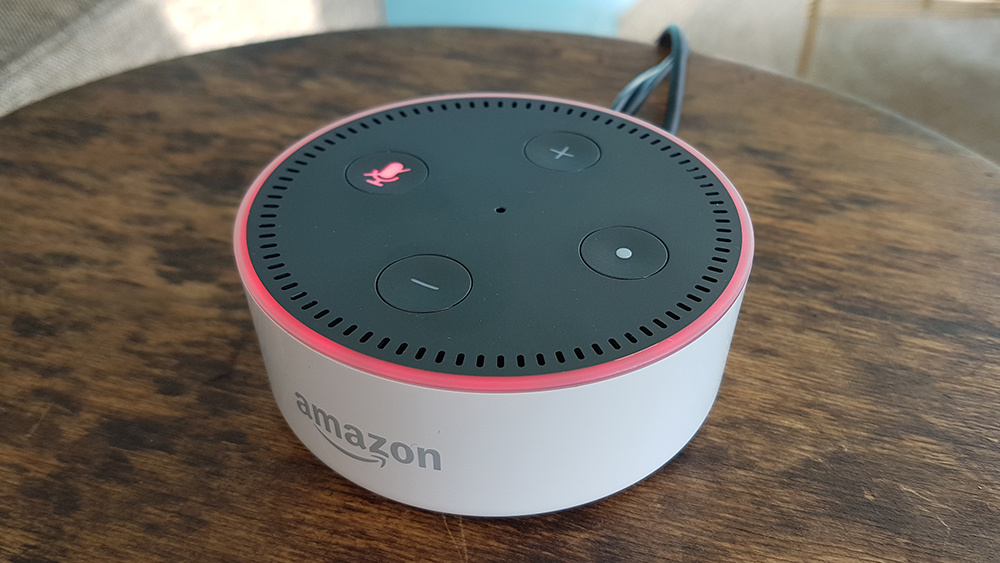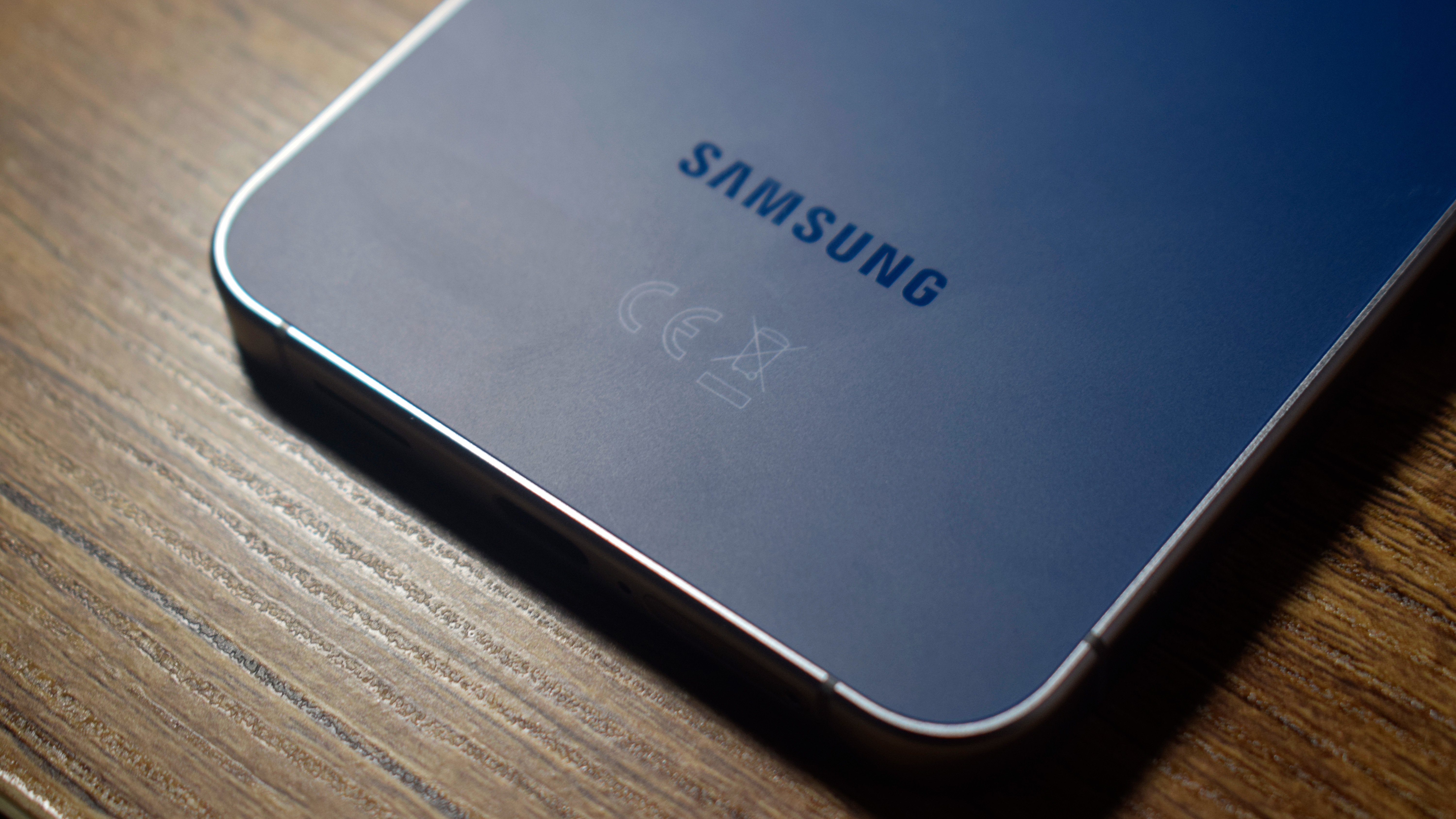Amazon Echo Dot review
The Echo's pint-sized stablemate still delivers the goods


If you're looking for a cheaper version of the exemplary Amazon Echo that you can connect to your existing speaker setup, then the Dot is perfect. It's got all the cloud-powered brains of Alexa, with the added bonus that it's small enough to slip into the background in your office or living room.
-
+
Small & unobtrusive; Aux connection for connecting to external soundsystems; Alexa is still the best digital assistant around;
-
-
Poor quality inbuilt speaker; Physical volume buttons aren't as nice as Echo's dial; Cheap-looking plastic finish

The Echo Dot is Amazon's affordable answer to those who want the power of its AI assistant Alexa without necessarily stumping up the cash for the full, speaker-powered version. Instead, the Dot is a stripped-down, no-frills version of Amazon's smart hub.
Design and appearance
The Echo Dot essentially resembles the top of the regular Echo, complete with its signature light ring. There are a few differences, however. While the Echo's plastic housing has a high-quality matte finish, the Dot is constructed from a glossy plastic, which feels cheaper, and a lot less premium.
On top of the Dot is a mute button - to ensure the Dot's inbuilt microphones aren't hearing you - and an action button, which you can press to summon Alexa if you're not using the wake word. They're also sharing space with buttons to turn the volume up or down, rather than the rotating dial control used to adjust the Echo. This is a shame, as the physical buttons don't feel nearly as smooth or satisfying as giving the dial a quick twist.
On the other hand, all of these points are counteracted by the fact that it's very small. At just 1.3in tall and 3.3in wide, it's easy to tuck the Dot unobtrusively out of the way, where you're not going to be bothered by the tacky finish or manual volume buttons.
Connections and speakers
One of the main use-cases for the Dot is for those who already have a fancy stereo system, and just want to connect Alexa to it without a superfluous speaker. It's got Bluetooth support as well as an auxiliary input, so you can connect both high-tech and analogue Hi-Fis.
Both Bluetooth and aux input work well, routing all of Alexa's responses through your chosen soundsystem. You can also connect a Bluetooth speaker while the Dot is still plugged in via Aux cable, although you can't use them both simultaneously.
However, if you're not particularly bothered about music and just want to use the Dot for Alexa's digital assistant and smart home control features, it's also got an inbuilt speaker, meaning you don't have to connect it to anything at all.
Sign up today and you will receive a free copy of our Future Focus 2025 report - the leading guidance on AI, cybersecurity and other IT challenges as per 700+ senior executives
Be warned, though - it's not very good at all. The Dot's internal speaker kicks out a fairly reasonable amount of volume (although nothing like as much as the Echo), but the audio quality isn't anything to write home about. There's virtually no bass, mid tones can sound distorted and the treble isn't especially clear.
Alexa
The beauty of Alexa is that because she lives in the cloud, the Dot functions in exactly the same way as the full-fat Amazon Echo. Anything you can do with the regular Echo, the Dot will do in exactly the same way, and she's just as excellent as she was when we reviewed the original Echo. For more details on what we thought of Alexa, check out that review.
Much like Siri or Cortana, Alexa is voice-controlled - just preface your request or query with the trigger word (which is 'Alexa' by default) and ask away. She uses a natural language engine too, so you can use conversation language rather than carefully constructing your syntax. You can ask her questions, use her to set timers or control smart home systems, or just tell her to put on a bit of music.
Like the Echo, the Dot uses a set of seven microphones to detect questions, and just like with the Echo, Alexa's voice recognition is excellent, even from across the room or with music playing. We did run up against some problems, however, mostly stemming from the fact that if you do decide to stow the Dot discreetly out of the way somewhere, it may have a slightly more difficult time picking up your questions on occasion.
Alexa's voice detection has been intelligently managed, too. After all, if you decide to outfit your home with multiple Alexa-enabled devices, the last thing you want is for all of them to respond to a question at once. Thankfully, both the Echo and the Echo Dot feature Echo Spatial Perception, which means Alexa will work out which device is closest to your voice and answer your query through that.
We found that Alexa took a little longer to respond to any questions asked within earshot of more than one Echo device, taking about a second to decide which one to respond with. However, the accuracy regarding which one was closest was as good as it needed to be.
Verdict
The Dot is everything that's great about Alexa and the entire Echo ecosystem, stripped down to the bare essentials. If you want Amazon's excellent AI assistant but don't need the Echo's inbuilt speaker, then the Echo Dot is the perfect way to get the best of both worlds. It's also an affordable way to bring Alexa into more rooms if you've already got one Echo device.
Verdict
If you're looking for a cheaper version of the exemplary Amazon Echo that you can connect to your existing speaker setup, then the Dot is perfect. It's got all the cloud-powered brains of Alexa, with the added bonus that it's small enough to slip into the background in your office or living room.
Adam Shepherd has been a technology journalist since 2015, covering everything from cloud storage and security, to smartphones and servers. Over the course of his career, he’s seen the spread of 5G, the growing ubiquity of wireless devices, and the start of the connected revolution. He’s also been to more trade shows and technology conferences than he cares to count.
Adam is an avid follower of the latest hardware innovations, and he is never happier than when tinkering with complex network configurations, or exploring a new Linux distro. He was also previously a co-host on the ITPro Podcast, where he was often found ranting about his love of strange gadgets, his disdain for Windows Mobile, and everything in between.
You can find Adam tweeting about enterprise technology (or more often bad jokes) @AdamShepherUK.
-
 Cybersecurity experts face 20 years in prison following ransomware campaign
Cybersecurity experts face 20 years in prison following ransomware campaignTwo men used their tech expertise to carry out ALPHV BlackCat ransomware attacks
By Emma Woollacott Published
-
 UK firms aim for growth through AI investment but lack of talent is a concern
UK firms aim for growth through AI investment but lack of talent is a concernTech training and upskilling will be a major focus in 2026
By Emma Woollacott Published
-
 Samsung unveils plan for AI transformation across all devices
Samsung unveils plan for AI transformation across all devicesBoth the DS and DX divisions of the business are profiting from the AI boom
By Jane McCallion Published
